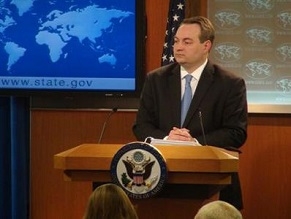|
World Jewish News

US State Department spokesman Patrick Ventrell: “What we’re really concerned about is the dramatic increase of Hezbollah activity inside of Syria.'
|
US hails EU’s easing of Syrian arms embargo as means to ‘advance our shared goal of achieving an negotiated political settlement
29.05.2013, Israel and the World The White House greeted news of the EU foreign affairs Council’s decision to ease its collective arms embargo on Syria as a means of allowing individual members to actively support the opposition, with Press Secretary Jay Carney declaring that “support for the opposition is a track that we are pursuing even as we also work with the opposition in an effort to realise the Geneva Communique and bring about the political transition that is envisioned in it”.
His sentiments were corroborated by a State Department briefing later the same day, as department spokesman Patrick Ventrell insisted that “while it is ultimately an EU decision, we do support the easing of the EU arms embargo as a part of the international community’s efforts to demonstrate its full support for the Syrian opposition”. “We believe that this step will advance our shared goal of achieving an negotiated political settlement,” he added.
Echoing British Foreign Secretary William Hague’s own response to the negotiated compromise of all 27 EU member states, which despite falling short of Britain and France’s calls to collectively arm the Syrian opposition, a move which drew sharp opposition from fellow EU members Austria and Sweden, offers its proponents “the flexibility to respond in the future if the situation continues to deteriorate and if the Assad regime refuses to negotiate”.
Mirroring Hague’s rhetoric, Ventrell said the renewal of all sanctions but the disputed arms embargo “gives the flexibility to specific EU member states to assist the opposition in a way that each sees fit under their own national decision making, and you know we’re working in the London 11 with this group of core supporters of the Syrian opposition, and this allows others to continue to accelerate that assistance to the opposition”. However, he maintained, US designs with regards to its response to the ongoing crisis in Syria still centred on the provision of “nonlethal assistance” in a coordinated fashion with its allies.
Whilst Carney was reluctant to offer staunch criticism on serial vetoer at the UN Security Council, close Syrian ally Russia’s continued supply of arms to authoritarian Syrian leader Bashar al Assad, relaying only America’s “unchanged” position that “we've made clear in the past and made clear again our firm belief that providing arms to the Assad regime does not bring us closer to the political transition that Syria deserves”, the State Department was rather more vehement in analysis.
“We have long said that we disagree with and we condemn the continued supply of Russian weapons to the regime, and this includes all class of weapons, and we’ve been clear throughout and very direct with the Russian Government about that,” maintained Ventrell in his comments to media Tuesday, reiterating that “we condemn all support of arms to the regime”.
“We’ve seen how the regime uses those arms. When we’re talking about the opposition, that’s a different group, and clearly they are people who are defending themselves in the face of an enormous onslaught and a despicable onslaught of violence against them – themselves,” he continued, with an apparent eye to embarking on its own future course of arms supply to opposition groups.
However, he insisted, support for the opposition and attempting to negotiate a political settlement with the under-fire Assad were “not sort of mutually exclusive”, rather concluding that they are “really on a parallel track”. Declining to speak for America’s allies’ intentions, he added that “the point of our support for this decision by the EU is that it provides more flexibility for the states that want to make a different decision regarding arms”.
Elsewhere in the media briefing, Ventrell reflected on the US administration’s continued concern about the impact of a possible spillover of Syrian tensions into neighbouring Lebanon, particularly in light of Lebanese militant group Hezbollah’s, designated a terrorist entity by both the US and Israel although, critically, not by the EU, increasing incursions on the ground in support of Assad’s forces. “What we’re really concerned about is the dramatic increase of Hezbollah activity inside of Syria. It’s destabilising to Syria, but it’s destabilising to Lebanon as well and goes against Lebanon’s decision to have – Lebanon has already had a position of disassociation, which we support. And so this Hezbollah decision to dramatically increase their activity inside of Syria goes directly against that policy,” he contended.
“We’ve been very clear about our concerns about the potential for spillover. Indeed, we’ve seen some of the destabilizing effects inside of Lebanon; we have concerns about some of the other neighbours, too, in terms of the negative impact that it can have on the neighbours,” concluded Ventrell.
by: Shari Ryness
EJP
|
|
